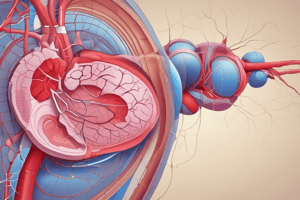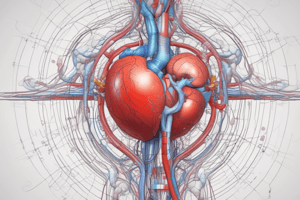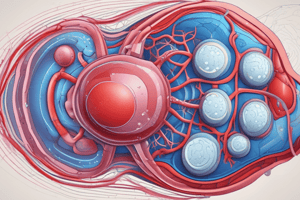Podcast
Questions and Answers
What is the definition of hypertension?
What is the definition of hypertension?
- Systolic blood pressure of 160 mm Hg or higher
- Systolic blood pressure of 120 mm Hg or higher
- Diastolic blood pressure of 100 mm Hg or higher
- Systolic blood pressure of 140 mm Hg or higher or a diastolic blood pressure of 90 mm Hg or higher (correct)
What is the primary consequence of untreated high blood pressure?
What is the primary consequence of untreated high blood pressure?
- Damage to blood vessels and acceleration of atherosclerosis (correct)
- Development of heart failure
- Development of kidney disease
- Development of diabetes
What is the main cause of increased peripheral vascular arteriolar smooth muscle tone?
What is the main cause of increased peripheral vascular arteriolar smooth muscle tone?
- Dietary factors
- Genetic factors
- Lifestyle factors
- Unknown in most cases (correct)
What percentage of adults are affected by hypertension?
What percentage of adults are affected by hypertension?
What is the primary difference between primary and secondary hypertension?
What is the primary difference between primary and secondary hypertension?
What is a common lifestyle factor associated with hypertension?
What is a common lifestyle factor associated with hypertension?
What is a potential complication of untreated hypertension?
What is a potential complication of untreated hypertension?
What percentage of cases of hypertension are considered secondary hypertension?
What percentage of cases of hypertension are considered secondary hypertension?
What is the primary mechanism by which β-blockers prevent sudden death in persons who have had a myocardial infarction?
What is the primary mechanism by which β-blockers prevent sudden death in persons who have had a myocardial infarction?
What is the effect of thiazide diuretics on blood pressure?
What is the effect of thiazide diuretics on blood pressure?
What is the mechanism by which thiazide diuretics decrease PVR?
What is the mechanism by which thiazide diuretics decrease PVR?
What is a unique property of nebivolol compared to other selective blockers of β1 receptors?
What is a unique property of nebivolol compared to other selective blockers of β1 receptors?
Which of the following β-blockers is used to treat hypertension in surgical patients and in persons with hypertensive emergencies?
Which of the following β-blockers is used to treat hypertension in surgical patients and in persons with hypertensive emergencies?
Why does the effect of a thiazide on PVR decrease if patients ingest enough dietary sodium?
Why does the effect of a thiazide on PVR decrease if patients ingest enough dietary sodium?
What is the role of angiotensin II in the body?
What is the role of angiotensin II in the body?
What is a common adverse effect of β-blockers?
What is a common adverse effect of β-blockers?
What is the advantage of using indapamide over hydrochlorothiazide?
What is the advantage of using indapamide over hydrochlorothiazide?
Which of the following β-blockers has antioxidant properties?
Which of the following β-blockers has antioxidant properties?
What happens to blood pressure in normotensive individuals when there is an increase in blood pressure?
What happens to blood pressure in normotensive individuals when there is an increase in blood pressure?
What is the effect of thiazide diuretics on potassium levels?
What is the effect of thiazide diuretics on potassium levels?
What is the effect of noncardioselective β-blockers on lipid metabolism?
What is the effect of noncardioselective β-blockers on lipid metabolism?
What is the effect of a higher dosage of thiazide diuretics on blood pressure?
What is the effect of a higher dosage of thiazide diuretics on blood pressure?
What is the primary goal of antihypertensive therapy?
What is the primary goal of antihypertensive therapy?
What is a potential side effect of thiazide diuretics on glucose levels?
What is a potential side effect of thiazide diuretics on glucose levels?
In which type of patients are β-blockers no longer recommended for the initial treatment of hypertension?
In which type of patients are β-blockers no longer recommended for the initial treatment of hypertension?
What is the set point at which blood pressure is controlled in hypertensive patients?
What is the set point at which blood pressure is controlled in hypertensive patients?
What is the benefit of β-blockers in persons with heart failure?
What is the benefit of β-blockers in persons with heart failure?
What is the role of the kidneys in regulating blood pressure?
What is the role of the kidneys in regulating blood pressure?
Why are thiazide diuretics often used in combination with other types of antihypertensive agents?
Why are thiazide diuretics often used in combination with other types of antihypertensive agents?
What is the effect of angiotensin II on blood vessels?
What is the effect of angiotensin II on blood vessels?
What is the indication for antihypertensive therapy in the general population at 60 years of age or older?
What is the indication for antihypertensive therapy in the general population at 60 years of age or older?
What is the mechanism by which diuretics lower blood pressure?
What is the mechanism by which diuretics lower blood pressure?
What do ARBs selectively block in various tissues?
What do ARBs selectively block in various tissues?
Why should ARBs not be combined with an ACE inhibitor for the treatment of hypertension?
Why should ARBs not be combined with an ACE inhibitor for the treatment of hypertension?
What is a common adverse effect of aliskiren?
What is a common adverse effect of aliskiren?
Why is aliskiren contraindicated during pregnancy?
Why is aliskiren contraindicated during pregnancy?
What is a common indication for the use of ARBs as first-line agents?
What is a common indication for the use of ARBs as first-line agents?
What is the primary mechanism of action of aliskiren?
What is the primary mechanism of action of aliskiren?
What type of medications include hydralazine, minoxidil, and nitroprusside?
What type of medications include hydralazine, minoxidil, and nitroprusside?
What type of patients may benefit from the use of CCBs?
What type of patients may benefit from the use of CCBs?
Study Notes
Renin-Angiotensin-Aldosterone System
- Renin converts angiotensinogen to angiotensin I, which is then converted to angiotensin II by angiotensin-converting enzyme (ACE)
- Angiotensin II is a potent circulating vasoconstrictor, constricting both arterioles and veins, and increasing renal sodium reabsorption and blood volume, leading to an increase in blood pressure
Regulation of Blood Pressure
- The sympathetic system and kidneys work together to maintain arterial blood pressure within a narrow range when a person is at rest
- They adjust blood pressure appropriately in response to postural changes and physical activity
- In normotensive individuals, an increase in blood pressure leads to a proportional increase in sodium and water excretion by the kidneys, reducing blood volume and blood pressure
- In hypertensive patients, the set point at which blood pressure is controlled is higher than normal, and an increase in blood pressure is not followed by a proportional increase in sodium and water excretion
Treatment Strategies
- The four major categories of antihypertensive drugs are diuretics, sympatholytic drugs, angiotensin inhibitors, and vasodilators
- These drugs lower blood pressure through actions at the kidneys, sympathetic nervous system, renin-angiotensin-aldosterone axis, or vascular smooth muscle
- The goal of antihypertensive therapy is to reduce cardiovascular and renal morbidity and mortality
- Antihypertensive therapy is indicated for individuals with systolic blood pressure ≥150 mm Hg or diastolic blood pressure ≥90 mm Hg, particularly those 60 years or older
Hypertension Overview
- Hypertension is defined as a sustained systolic blood pressure ≥140 mm Hg or diastolic blood pressure ≥90 mm Hg
- Untreated hypertension damages blood vessels, accelerates atherosclerosis, and produces left ventricular hypertrophy, contributing to ischemic heart disease, stroke, heart failure, and renal failure
- Hypertension results from increased peripheral vascular arteriolar smooth muscle tone, leading to increased arteriolar resistance and reduced capacitance of the venous system
- In most cases, the cause of increased vascular tone is unknown
- Elevated blood pressure is a common disorder, affecting approximately 30% of adults
- Chronic hypertension can lead to heart disease and stroke, but early diagnosis and proper treatment can significantly decrease morbidity and mortality
Diuretics
- Thiazide diuretics decrease blood pressure by reducing sodium content of arteriolar smooth muscle cells, which decreases muscle contraction in response to vasopressor agents
- Hydrochlorothiazide is a commonly used thiazide diuretic, reducing blood pressure by 10-15 mm Hg
- Indapamide and chlorthalidone have similar efficacy, and indapamide has the additional benefit of causing vasodilation via calcium channel blockade
- Thiazide diuretics are often used in combination with other antihypertensive agents
- Adverse effects of thiazide diuretics include hypokalemia, which may contribute to cardiac arrhythmias and muscle weakness, as well as elevated plasma levels of glucose, uric acid, and lipids
Beta-Blockers
- Selective blockers of β1 receptors, such as metoprolol and atenolol, are commonly prescribed β-blockers
- Nebivolol is a selective blocker of β1 receptors that also increases nitric oxide production, leading to vasodilation
- β-blockers are beneficial in hypertensive patients with other cardiovascular diseases, such as coronary heart disease, heart failure, and myocardial infarction
- Adverse effects of β-blockers include hypotension, bradycardia, fatigue, insomnia, decreased libido, and erectile dysfunction
- Noncardioselective β-blockers may disturb lipid metabolism and impair glycemic control
Angiotensin Receptor Blockers
- ARBs selectively block angiotensin AT1 receptors, reducing vasoconstriction, aldosterone secretion, sodium reabsorption, and norepinephrine release
- ARBs are often effective as monotherapy and can be combined with a diuretic, CCB, or other antihypertensive agent when greater blood pressure reduction is needed
- Adverse effects of ARBs are similar to those of ACE inhibitors, although the risks of cough and angioedema are decreased
- ARBs should not be combined with an ACE inhibitor for the treatment of hypertension due to similar mechanisms and adverse effects
- ARBs are contraindicated during pregnancy
Renin Inhibitor
- Aliskiren is a selective renin inhibitor available for the treatment of hypertension
- Aliskiren directly inhibits renin, acting earlier in the renin-angiotensin-aldosterone system than ACE inhibitors or ARBs
- Aliskiren should not be combined with an ACE inhibitor or ARB in the treatment of hypertension
- Adverse effects of aliskiren include diarrhea, cough, and angioedema, but less often than ACE inhibitors
- Aliskiren is contraindicated during pregnancy and is metabolized by CYP3A4, with many drug interactions
Vasodilators
- Vasodilators include CCBs and other agents such as hydralazine, minoxidil, and nitroprusside
- CCBs are used to treat hypertension, angina pectoris, peripheral vascular disorders, and cardiac arrhythmias
- CCBs are useful in hypertensive patients with diabetes or stable ischemic heart disease
Studying That Suits You
Use AI to generate personalized quizzes and flashcards to suit your learning preferences.
Description
This quiz covers the renin-angiotensin-aldosterone system, including its effects on blood pressure and the sympathetic nervous system.




